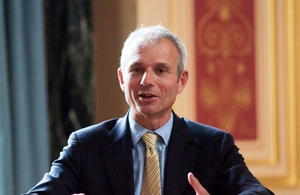David Lidington, Britain’s minister for Europe, went to Berlin yesterday “to tackle head-on some of the misconceptions about the UK’s approach to the European Union.” In a speech to an EU organisation called Europe Network Germany he insisted that “Britain has a positive agenda for Europe” – then immediately went on to attack the way Jean-Claude Juncker has been chosen as the candidate to be the next president of the European Commission, saying “it is just plain wrong.”
Lidington denounced the “so-called Spitzenkandidaten process” – the system by which each of the groups in the European Parliament chooses its candidate to be top man at the commission — saying it “has no clear basis in EU law, was never discussed and agreed by our leaders and flies in the face of the consensual way, the European way that we have always taken these decisions.”
He said that to insist the choice must depend on the outcome of the European Parliamentary elections “is just plain wrong.”
Juncker was the candidate of the European People’s Party (EPP) group at the parliament, and the EPP won most seats in last month’s elections.
Despite David Cameron’s opposition to the appointment of Juncker, it now looks certain that the European Council, made up of the heads of government of the EU member states, will follow the choice of the parliament when it meets this week and will nominate him as the next president of the commission.
Lidington insisted this would show the independence of the commission “is being undermined.”
“We run the very real risk that, almost by accident, the once independent Commission becomes a creature of the European Parliament, working in the interests of a single political grouping. So let us be clear: a decision by the European Council to nominate a candidate based on this process will have lasting consequences.”
This was an echo of Cameron’s earlier comment that appointing Juncker would have “consequences.” The prime minister was reported to have threatened in private that if Juncker became head of the commission over Britain’s objections, he may be forced to bring forward the promised referendum on membership of the EU.
The so-called “EU moderate” Lidington was appointed Europe minister in 2010, replacing the eurosceptic Mark Francois, a move which the Guardian said at the time was “a sign of the influence of the passionately pro-European Nick Clegg.”
Lidington’s appointment was meant to repair relations with centre-right leaders across the EU. However, German Chancellor Angela Merkel almost every other centre-right leader at this week’s European Council will vote in favour of Juncker and against Cameron’s resistance to his nomination.
Yesterday Lidington also questioned democracy in the EU. He said: “People need to know that their voice counts in the organisations whose decisions have such an impact upon their lives. And at the moment in Europe that simply isn’t the case.”
“Across our continent, voters chose to stay at home, to vote in record numbers for populist, anti-EU parties of both right and left. And the truth is, this shouldn’t be a surprise, when survey after survey has shown that trust in the EU institutions is at historic lows.”
He called for more involvement by national parliaments in EU decision making: “National parliaments have a positive role to play, both sharing their expertise with EU institutions and helping citizens to feel connected with the EU.”

COMMENTS
Please let us know if you're having issues with commenting.